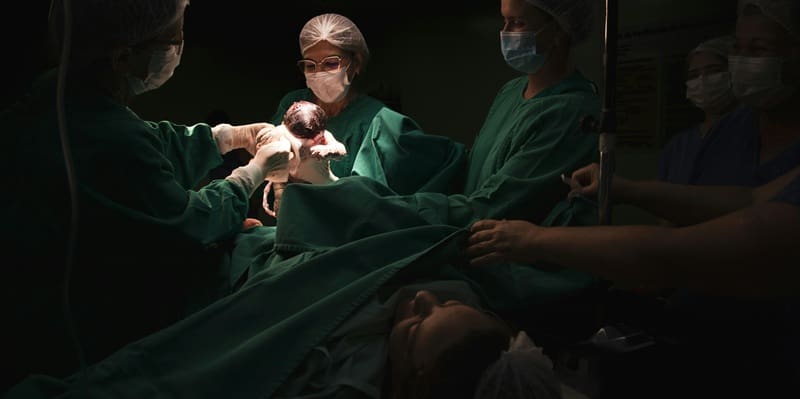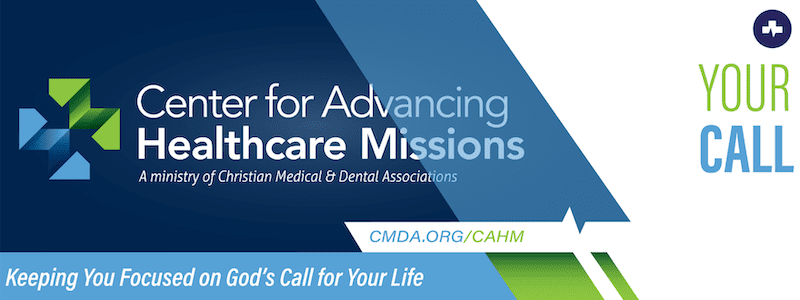
Whispered Warnings
Christian Medical & Dental Associations®
June 27, 2025
“And these are but the outer fringe of his works; how faint the whisper we hear of him! Who then can understand the thunder of his power” (Job 26:14)?
It was early Sunday morning at our 110-bed rural Kenyan mission hospital and I was the only doctor on duty. As I woke up, the dreaded summons to the obstetric ward was delivered at my bedroom window by the night watchman. Five midwives did an average of 100 deliveries every month. They called the doctor for breech deliveries and other complications of labor. My internal medicine and infectious diseases training left many general medicine gaps. The total of my obstetric experience amounted to five deliveries done as a fourth-year medical student. I avidly read textbooks and even found useful clues about obstructed labor in cattle from our family reading time of All Creatures Great and Small.
In my first year as a missionary doctor, I felt overwhelmed and frequently incompetent. Beyond challenging medical duties, my wife, three young children, house repairs and hospital administrative tasks all vied for focus and attention. Nightly reading of medical texts became part of a daily survival strategy. Among many other topics, I studied the correct techniques for breech deliveries, the proper use of forceps, and the rarely used symphysiotomy.
This particular Sunday, the summons to the obstetrics ward was due to a combination of difficult issues, a transverse lie and a dead baby. The mother had arrived at the delivery ward after laboring overnight. Friends helped her walk to the hospital. Midwives immediately saw the baby’s presenting hand. Our hospital did not have an ultrasound machine, so using the obstetric cone stethoscope, they searched in vain for a fetal heartbeat. As I arrived, the mother was informed of the baby’s death.
Cesarean section seemed a sad way to deliver a dead baby, leaving more potential complications for future pregnancies. As I stood pondering what to do, I said one of my frequent, pleading, and desperate prayers. My deeply felt ignorance flowed naturally in appeal to the Great Physician. “Lord help me!”
The best option seemed to be an attempt to reposition the baby into a vertex or breech position. In the face of active labor, this presents a huge challenge. With my arm inside the birth canal and the other hand on the abdomen, I worked for over an hour without success. Finally, the tip of my finger caught the angle of the baby’s pelvis and thigh. Slowly it turned into a breech position.
As the mother pushed, the buttocks presented and then the legs. At this point in a breech delivery, there are several rotations and a sweeping of the arms across the chest to avoid hyperextension at the shoulder with potential for brachial plexus injury. I felt exhausted. My impulse was to just pull the baby out and be done with it. But in one of the clearest communications I ever sensed from God, I heard this strong command: “Don’t do it! Do it right!” So, in obedience to the unexpected voice, I swept both arms, rotated the face posteriorly, and lifted the baby out suspended by the feet.
The next voice shattered the gloom with an unmistakable “WAHHHH” after the first breath of the supposedly dead baby. Shocked into action, I called for a suction bulb as everyone animatedly moved into newborn care mode. A completely heathy looking boy was wrapped and placed on his mother’s chest.
I later suspected that the midwives may have missed the heartbeat because the baby’s chest was pressed far posteriorly into the pelvis due to the transverse lie. It is also possible that God chose to act beyond anything I could have asked or imagined (Galatians 2:20).
The delivery of a healthy newborn is one of the most thrilling experiences of medicine. No matter how many times it has happened, each birth is full of mystery, hope, and love that transfix all attention.
I have not done deliveries since leaving Kenya but have transferred one principle from this experience to many other situations. When feeling in a hurry, often tired and obsessed with finishing the job, shortcuts sound appealing. “Do it right” is an often-whispered warning. Time, stress and lack of margin easily squeeze us into efficiency-driven tyranny of the urgent, but it takes time to do things well.
Each of our lives are unique and full of opportunity to see faith, hope and love at work through the power of the Holy Spirit. When you share your medical faith stories with others, the personal and temporary become pieces of the eternal Good News of Jesus Christ. Listen for his voice in the cacophony of daily noise and duties. Then do it right!
About the Author
Dr. Sam Palpant was the Medical Director at a Quaker mission hospital in rural western Kenya for six years in the 1980s. He subsequently worked for 31 years as the Associate Director for the Spokane Internal Medicine Residency training program. He retired from clinical practice in 2018 but still teaches parasitology to medical students. Dr. Palpant has spoken multiple times at the Christian Medical & Dental Associations Continuing Medical Education Conferences for medical missionaries in Thailand and Kenya, and also at the Global Mission Health Conference for prospective medical missionaries in Louisville, Kentucky.
“In alert expectancy such as this, we’re never left feeling shortchanged. Quite the contrary—we can’t round up enough containers to hold everything God generously pours into our lives through the Holy Spirit” (Romans 5:4-5, MSG)
Read More“Not that I was ever in need, for I have learned how to be content with whatever I have. I know how to live on almost nothing or with everything. I have learned the secret of living in every situation, whether it is with a full stomach or empty, with plenty or little. For I can do everything through Christ, who gives me strength” (Philippians 4:11-13, NLT).
Read More“Not that I was ever in need, for I have learned how to be content with whatever I have. I know how to live on almost nothing or with everything. I have learned the secret of living in every situation, whether it is with a full stomach or empty, with plenty or little. For I can do everything through Christ, who gives me strength” (Philippians 4:11-13, NLT).
Read MoreConsultBridge is a non-profit platform connecting frontline healthcare missionaries with specialist doctors for virtual consultations. By providing timely medical expertise in underserved regions, it empowers missionaries to deliver better patient care while specialists contribute their skills from afar.
Read MoreA physician’s journey from Ethiopia’s famine relief to medical teaching in China reflects resilience, faith and service. Through life-saving care, gospel outreach and mentorship, their story highlights enduring hope and the transformative power of compassionate healthcare and ministry
Read MoreIn a tech-saturated world, Dr. Ruth Lindberg explores how constant digital distractions can pull us away from a deeper relationship with Jesus. She offers practical tips for reducing screen time, refocusing our attention and embracing the peace and presence of God.
Read MoreToday, the Tenwek Community Health and Development (TCHD) program little resembles the original program begun 40 years ago. That is a good thing! The goals of the program haven’t changed, but the strategies certainly have evolved.
Read MoreWhen we decided to attempt a public health campaign for pediatric pedestrian safety, we opted for an emphasis on community and solidarity, believing these cultural values were more likely to anchor the message beyond one cycle of road traffic accidents.
Read MoreJust months before the end of our four-year term in Nepal, a young mother died at our hospital. Though our staff did nothing wrong and worked tirelessly to save her, those local leaders took advantage of the situation to foment hostility. Before we knew it, a volatile, angry mob was at our door, making demands and threats.
Read MoreI am a family medicine physician three years out of residency seeking to rejoice in what I am suffering for the sake of His body. I live with my husband and our three young children, with a fourth on the way, in a Central Asian country run by a terrorist group very much in need of the gospel.
Read More
